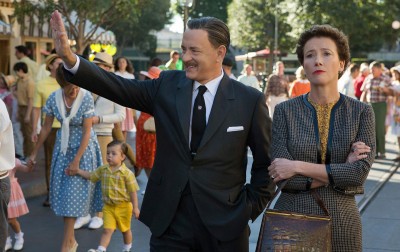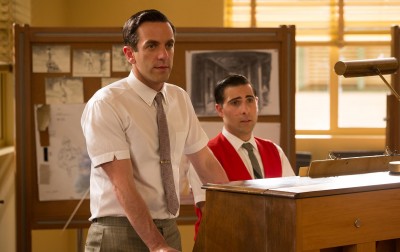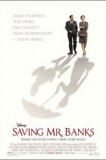| Reviews & Columns |
|
Reviews DVD TV on DVD Blu-ray 4K UHD International DVDs In Theaters Reviews by Studio Video Games Features Collector Series DVDs Easter Egg Database Interviews DVD Talk Radio Feature Articles Columns Anime Talk DVD Savant Horror DVDs The M.O.D. Squad Art House HD Talk Silent DVD
|
DVD Talk Forum |
|
|
| Resources |
|
DVD Price Search Customer Service #'s RCE Info Links |
|
Columns
|
|
|
Saving Mr. Banks
Sometimes the thought of chronicling how a film was brought to life from its original print medium is shown for audiences and it works. Sometimes it does not. But when you use a couple of two-time Oscar winners as your stars and set it against arguably the most familiar family-friendly logo in America, the final work would possibly be hard to dispute, no? And on the surface, the story of Saving Mr. Banks is admittedly an intriguing one.

The screenplay was written by Kelly Marcel and Sue Smith. The former has some writing credits, most recently on the short lived series Terra Nova, the latter from the quiet independent film Peaches. With John Lee Hancock (The Blind Side) directing, the story chronicles the process of securing the literary work of P.L. Travers (Emma Thompson, Love Actually) to cinema, specifically for the film Mary Poppins). The film shows her sometimes contentious battles with Walt Disney (Tom Hanks, Cloud Atlas), and her arduous process in working with the writers, specifically Don DaGradi (Bradley Whitford, The West Wing) and brothers Robert (B.J. Novak, The Office) and Richard Sherman (Jason Schwartzman, Fantastic Mr. Fox). Through it all, Walt attempts to pry the rights to her books for adaptation and eventual cinematic interpretation. Over the course of the film we see Travers reflect on what brought her to that point and some of the inspirations for her books, mainly centered on the relationship between her (as a child) and her alcoholic father (Colin Farrell, Seven Psychopaths).
It is on the latter the film spends a lot of its time, and to its detriment overly so. Saving Mr. Banks does a lot in the first act of the film to show the viewer that Travers is an almost stereotypic crusty British woman. The flashbacks hamper the development of the Travers character, resulting in a twofold effect: the viewer tends to look for the flashbacks after awhile, and it hampers any needed character development in the Travers character, and even with Thompson's charisma injected into her, does not do enough for a vital cog in the movie.
To further clarify, it is not that Thompson's performance as Travers is horrible, in fact it is pleasant and generally without issue. But the character itself tends to lack faults, or to put it another way, they seem to be glossed over for Hancock's choice of saying essentially, "Hey! Emma Thompson is on screen! She is a nice lady!" The same could be said of Hanks' performance as Disney, except replacing the lady label of course. The characters are more saccharine, even whitewashed, than they should be. For instance, Robert Sherman (Nowak) was wounded in World War II and like Sherman, Nowak walked with a cane. While the fact that Robert's cane is discussed and even the fact that he got a cane as a result of his duty was inferred, Robert's infatuation with British culture (which he picked up while recovering from his injuries) is virtually left unattended. These minor neglects or convenient omissions seem to recur throughout the film.
Is the film worthy of dismissing because of these omissions? I don't think so. There is little doubt the film has an underlying layer of saccharine behind what goes on for it so the viewer goes along for the ride. I mean, we know at this point that Mary Poppins does get made into a film don't we? Otherwise I don't know what I linked to. That said, the gradual relenting of Travers, particularly during the "Let's Go Fly A Kite" sequence that is among its most effecting. I am willing to admit that moments like that are easily ones that make this stodgy guy tear up, to say nothing for Travers' attending of the Hollywood premiere (despite Disney's initial reluctance) and what she experienced during her time in the theatre.
If the contention is that I did not like Saving Mr. Banks because I refused to be swept up in the sweetness and the fun, I would disagree with that. My contentions are that it does not earn as much disbelief as it thinks it does and the use of the flashback sequences is excessive, to the point of disrupting the contemporary story, and the film suffers as a result. I do not have a problem getting sweet-talked into something I may be reluctant to experience, but if the talk is barely worth listening to, then I hardly think anyone else should expose themselves to it either.

|
| Popular Reviews |
| Sponsored Links |
|
|
| Sponsored Links |
|
|
| Release List | Reviews | Shop | Newsletter | Forum | DVD Giveaways | Blu-Ray | Advertise |
|
Copyright 2024 DVDTalk.com All Rights Reserved. Legal Info, Privacy Policy, Terms of Use,
Manage Preferences,
Your Privacy Choices | |||||||










